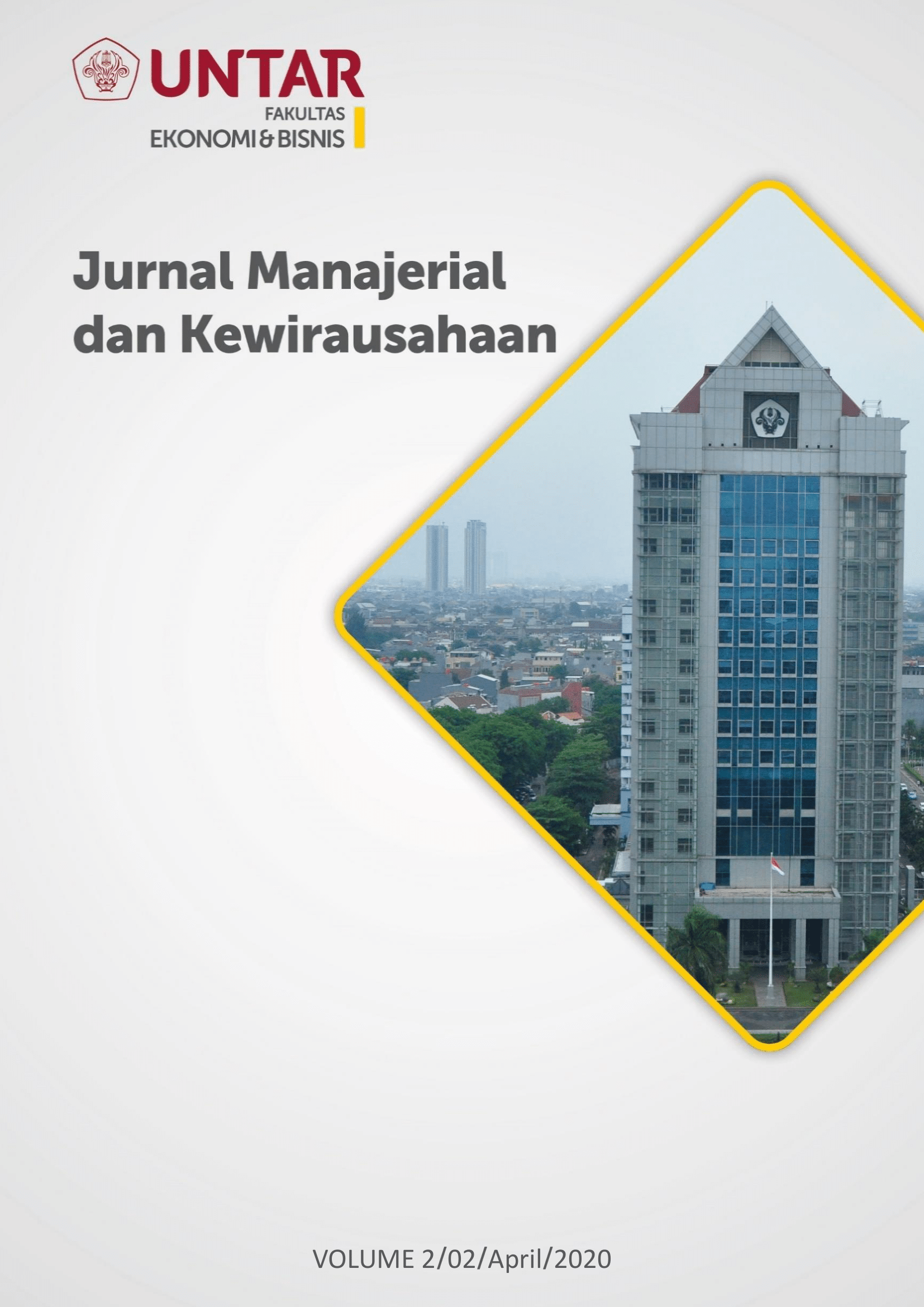Pengaruh Modal Sosial Terhadap Penciptaan Usaha Baru Yang Dimediasi Oleh Efikasi Diri Pada Mahasiswa Jurusan Manajemen Fakultas Ekonomi Dan Bisnis Universitas Tarumanagara
Main Article Content
Abstract
This study was conducted with the aim of finding out whether there is an effect of social capital on the new venture creation with self-efficacy as a mediating variable. The subjects of this study were 40 students majoring in management at the Tarumanagara University Faculty of Economics and Business who have a private business with a business age under 5 years. The sampling method is done by purposive sampling method. This study uses data analysis with the Partial Least Square (PLS) approach in the form of the Smart-PLS application version 3.0. The findings show that social capital does not significantly affect new venture creation. However, there is an indirect effect of social capital on new venture creation through self-efficacy as a mediating variable.
Penelitian ini dilakukan dengan tujuan untuk mengetahui apakah terdapat pengaruh modal sosial terhadap penciptaan usaha baru dengan efikasi diri sebagai variabel mediasi. Subyek penelitian ini adalah 40 mahasiswa jurusan manajemen Fakultas Ekonomi dan Bisnis Universitas Tarumanagara yang memiliki bisnis pribadi dengan usia bisnis dibawah 5 tahun. Metode pengambilan sampel dilakukan dengan metode purposive sampling. Penelitian ini menggunakan analisis data dengan pendekatan Partial Least Square (PLS) berupa aplikasi Smart-PLS versi 3.0. Temuan menunjukkan bahwa modal sosial tidak berpengaruh secara signifikan terhadap penciptaan usaha baru. Namun, terdapat pengaruh tidak langsung modal sosial terhadap penciptaan usaha baru lewat efikasi diri sebagai variabel mediasi.
Article Details
Section
This work is licensed under a Jurnal Muara Ilmu Ekonomi dan Bisnis Creative Commons Attribution-ShareAlike 4.0 International License.,/p>
References
Bandura, A. (1986). Social foundations of thought and action: A social cognitive theory. Engle wood Cliffs, NJ: Prentice-Hall.
Baron, R. A. & Markman, G. D. (2003). Beyond social capital: the role of entrepreneur’s social competence in their fimamcial success. Journal of Business Venturing, Vol. 18, No. 1, pp. 41-60.
Baron, R. A. & Markman, G. D. (2007). Behavioral and cognitive factors in entrepreneurship: entrepreneurs as the active element in new venture creation. Strategic Entrepreneurship Journal, Vol. 1, Nos 1-2, pp. 167-182.
Bates, T. & Dunham, C. R. (1993). Asian-American success in self-employment. Economic Development Quarterly, Vol. 7, No. 2, pp. 199-214.
Chen, C. C., Greene, P. G. & Crick, A. (1998). Does entrepreneurial self-efficacy distinguish entrepreneurs from managers? Journal of Business Venturing, Vol. 13, No.4, pp. 295-316.
Coleman J. S. (1988). Social capital in the creation of human capital. American Journal of Sociology, 94, 95–120.
Davidsson, P. & Honig, B. (2003). The role of social and human capital among nascent entrepreneurs. Journal of Business Venturing, Vol. 18, No. 3, pp. 301-331.
De Carolis, D.M. & Saparito P. (2006). Social capital, cognition, and entrepreneurial opportunities: a theoretical framework. Entrepreneurship Theory and Practice, Vol. 30, No. 1 pp. 41-56.
De Carolis, D. M., Litzky, B.E., & Eddleston, K.A. (2009). Why networks enhance the progress of new venture creation: the influence of social capital and cognition. Entrepreneurship Theory and Practice, Vol. 33, No. 2, pp. 527-545.
De Noble, A. F., Jung, D. & Ehrlich, S. B. (1999). Entrepreneurial self-efficacy: the development of a measure and its relationship to entrepreneurial action. Frontiers of Entrepreneurship Research, Vol. 1999, No.1, pp. 73-87.
Fukuyama, F. (2001). Social capital, civil society and development. Third World Quarterly, 22(1), 7-20. http://dx.doi.org/10.1080/713701144
Hair, J. F., Sarstedt, M., Ringle, C. M., & Mena, J.A. (2012). An assessment of the use of partial least squares structural equation modeling in marketing research. Journal of the Academy of Marketing Science, Vol. 40, No. 3, pp. 414-433.
Halpern, D. (2005). Social Capital. Cambridge: Polity Press.
Haryono, S. (2017). Metode SEM untuk Penelitian Manajemen AMOS LISREL PLS. Jakarta: Luxima Metro Media.
Hisrich, R. D, Peters, M. P., & Shepherd, D. A. (2008). Entrepreneurship: Mc Graw Hill International Edition.
Kannadhasan, M., Charan, P., Singh, P., & N. S. (2018). Relationships among social capital, self-efficacy, and new venture creations. Management Decision, 56(1), 204-218.
Kementrian Komunikasi dan Informatika Republik Indonesia. (2017). Peluang Besar Jadi Pengusaha Di Era Digital. Diambil kembali dari Kementrian Komunikasi dan Informatika Republik Indonesia: https://kominfo.go.id/content/detail/9503/peluang-besar-jadi-pengusaha-di-eradigital/0/berita tanggal 2 September 2019.
Krueger, N. F. Jr. (2003). The cognitive psychology of entreprenurship. Handbook of Entrepreneurship Research, Springer, Boston, MA, pp. 105-140.
Liao, J. & Welsch, H. (2005). Roles of social capital in venture creation: key dimension and research implication. Journal of Small Business Management, Vol. 43, No.4, pp. 345-362.
Mitchell, R. K., Busenitz, L., Lant, T., McDougall, P. P., Morse, E. A. & Smith, J. B. (2002). Toward a theory of entrepreneurial cognition: rethinking the people of side of entrepreneurship research. Entrepreneurship Theory and Practice, Vol. 27, No. 2, pp. 93-140.
Nahapiet, J., & Ghoshal, S. (1998). Social capital, intellectual capital, and the organizational advantage. Academy of Management. The Academy of Management Review, 23(2), 242-266.
Nunnally, J. C. (1967). Psychometric Theory. McGraw-Hill, New York, NY.
Oviatt, B. M. & McDougall, P. P. (1997). Challenges for internationalization process theory: the case of international new ventures. Management International Review, Vol. 37, No. 1, pp. 85-99.
Ozdemir, S. Z., Moran, P., Zhong, X. & Bliemel, M. J. (2014). Reaching and acquiring valuable resources: the entrepreneur’s use of brokerage, cohesion, and embeddedness. Entrepreneurship Theory and Practice, Vol. 40, No. 1, pp. 49-79.
Puhakka, V. (2006). Effects of social capital on the opportunity recognition process. Journal of Enterprising Culture, Vol. 14, No. 02, pp. 105-124.
Thurik, R. & Wennekers, S. (2004). Entrepreneurship, small business and economic growth. Journal of Small Business and Enterprise Development, Vol. 11, No. 1, pp. 140-149.
Wilson, F., Kickul, J., Marlino, D., Barbosa, S. D. & Griffiths, M. D. (2009). An analysis of the role of gender and self-efficacy in developing female entrepreneurial interest and behavior. Journal of Development Entreprneurship, Vol. 14, No. 2, pp. 105-119.
Wood, R. & Bandura, A. (1989). Social cognitive theory of organizational management. Academy of Management Review, Vol. 14, No. 3, pp. 361-384.

